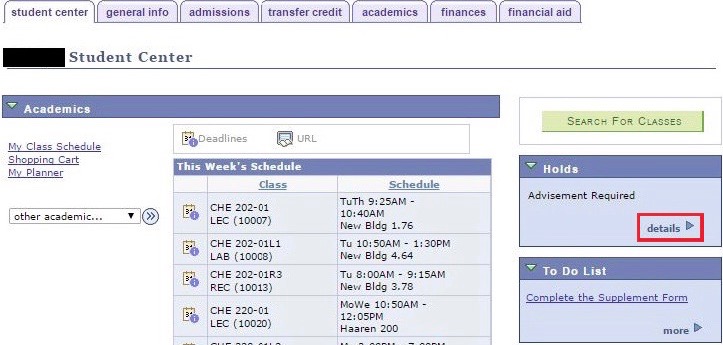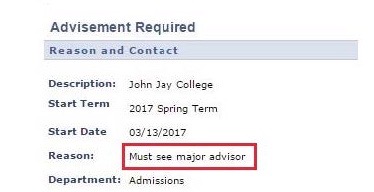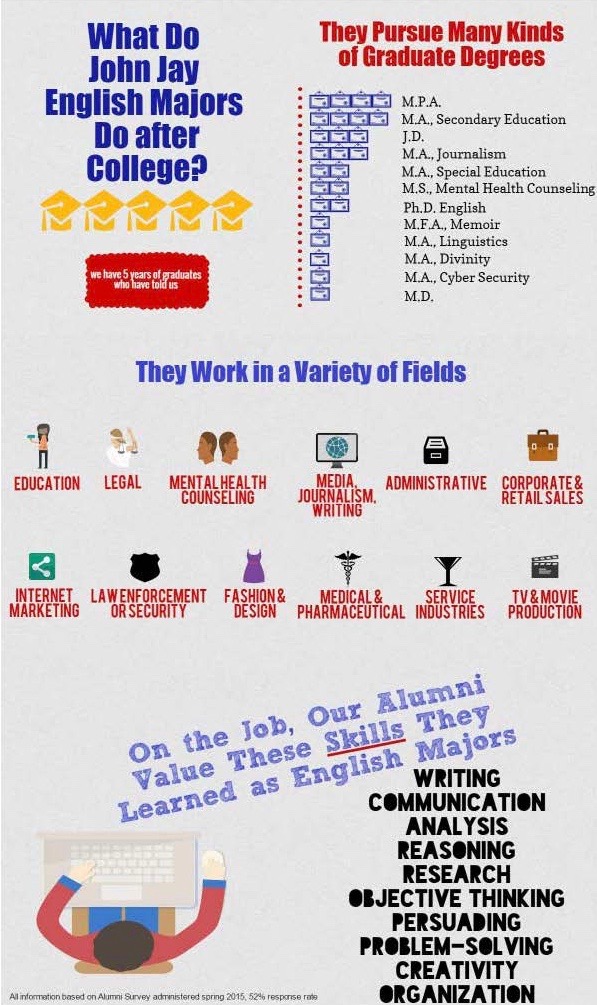English Major Resources
Here you will find:
- Key information about your major
- How and when to meet with your major advisor
- Planning tools that will help you track your progress in the major
- Ways to explore career opportunities related to the English major
Take a few moments to look at the information below. It will help you plan effectively and avoid surprises during your studies at John Jay. Please visit the English Department's website for information, resources, and opportunities!
English Requirements
You are responsible for the major requirements that were in effect when you declared the major. To confirm the requirements you should be following, go to the Undergraduate Bulletin for that academic year. For example, if you declared the English major in Fall 2015 or Spring 2016, you would click on the 2015-2016 Undergraduate Bulletin. If you declared the major and then left the College for more than one full semester, you’re responsible for the major requirements in effect when you return, if they have changed.
Below, find the Undergraduate Bulletin that was in effect when you declared the major.
- 2024-2025 Undergraduate Bulletin - ENG
- 2023-2024 Undergraduate Bulletin - ENG
- 2022-2023 Undergraduate Bulletin - ENG
- 2021-2022 Undergraduate Bulletin - ENG
- 2020-2021 Undergraduate Bulletin - ENG
- 2019-2020 Undergraduate Bulletin - ENG
- 2018-2019 Undergraduate Bulletin - ENG
- 2017-2018 Undergraduate Bulletin - ENG
- 2016-2017 Undergraduate Bulletin - ENG
- 2015-2016 Undergraduate Bulletin - ENG
- 2014-2015 Undergraduate Bulletin - ENG
- 2013-2014 Undergraduate Bulletin - ENG (PDF)
- 2012-2013 Undergraduate Bulletin - ENG (PDF)
Important information about major requirements!
For Historical Perspectives
There are courses that can substitute for some of the requirements listed in the Bulletin. Students may choose the fIollowing elective courses as alternatives to satisfy PART THREE-Historical Perspectives: For LIT 371 take LIT 319; for LIT 372 take LIT 313 or LIT 314; for LIT 375 take LIT 344 or LIT 357 or LIT 383. Please note that courses cannot count in more than one area of the major.
For students who want a Literature & Law concentration
Students with a concentration in Literature & Law should choose their major electives from this list: ENG 250, ENG 328/ANT 328, ENG 350, ISP 321, ISP 322, LIT 219, LIT 311, LIT 314, LIT 315, LIT 319, LIT 323, LIT 342, LIT 348, LLS 363. Check the current schedule for availability.
Students in this concentration should also choose LIT 405 rather than LIT 400 as their capstone course.
| Each of the following English courses can count toward your major requirements and toward your General Education requirements: | ||||||
| World Cultures | LIT 236 | |||||
| U.S. Experience | LIT 233 | LIT 265 | ||||
| Creative Expression | LIT 241 | ISP 235 | ISP 236 | LIT 230 | ENG 247 | |
| Individual and Society | LIT 232 | ENG 225 | ||||
| Scientific World | LIT 239 | |||||
| 300 Level Justice | ISP 321 | ISP 322 | LIT 326 | LIT 327 | LLS 363 | LLS 364 |
| Learning from the Past | LIT 237 | |||||
| Communications | ISP 273 |
Major Advising
Students who need English major advising during Fall 2025 can contact Professor Paul Narkunas (jnarkunas@jjay.cuny.edu).
Students who need English major advising during Summer session 2025 can contact Professor Paul Narkunas (jnarkunas@jjay.cuny.edu).
All sophomores who have a declared English major and who have earned between 45-59 credits will have a hold placed on their registration record so that they can be advised by a professor in the English Major before enrolling in future courses. Students must see an advisor in the major in order to have the registration hold removed. This is an important time for students to be sure they are on the right track and to learn about special opportunities in the major.
In the month before Registration begins, the English Major Advisor will send emails to those students with registration holds, inviting them to sign up for 30-minute appointments with any one of the available professors. Advising of students with holds will continue until the beginning of the next semester, but we strongly urge students to meet with an English professor in the weeks leading up to Registration to ensure enrollment in required courses.
How do you know if you have a major hold? Go to CUNYfirst and complete the following steps:
- Check the Holds box of your CUNYfirst Student Center. If "Advisement Required" appears, click on “details.”

- Click on “Advisement Required.”

- See which type of advisement you need. If you must see a major advisor, then make a major advising appointment following the steps preferred by this department.

Plan Ahead: Graduate on Time
In addition to the ENG 201 prerequisite, remember the English major requires an additional foundation course of one general education Literature course: ISP 235, ISP 236, ISP 273, LIT 230, LIT 231, LIT 232, LIT 233, LIT 236, LIT 237, LIT 239, LIT 326, LIT 327

-
All English majors should plan to take LIT 260, LIT 300, LIT 305, and finally LIT 400 or LIT 405 in sequential semesters. As illustrated above, you should plan to take courses in the major for at least four semesters - though LIT 300 and LIT 305 can be taken in the same semester.
-
While taking these required core courses, we advise you to take one Historical Topics course and one LIT or ENG major elective per semester.
-
To get the most out of the experience, and to be successful, students should not take more than three literature courses per semester.
- Remember that you will need at least a 2.0 GPA in the major and at least a 2.0 overall GPA to graduate.
- DegreeWorks degree audit - Use this online planning tool to track your overall progress toward graduation. You will see which of your general education and major requirements are completed, in progress, or still needed. Refer to the DegreeWorks FAQs to better understand how to use this helpful tool. Note: be sure to confirm the accuracy of your degree audit with a general advisor and major advisor.
- Fill out the English Major Checklist for students who declared before fall 2017 or the English Major Checklist for students who declared fall 2017 or later to keep track of which major requirements you have completed and which ones you still need.
- Sample Four Year Plan - See an example of how you could complete all your degree requirements (major, general education, electives) and graduate in four years! Remember that this sample plan shows just one possible way to combine your requirements. Transfer students in particular should work with advisors to determine a plan that works best for them.
A General Academic Advisor will confirm what general academic requirements you still need, make suggestions about smart course planning that will help you graduate without delays, discuss your interest in adding a minor or second major, inform you about opportunities such as study abroad, discuss general questions and concerns, and make helpful referrals. Visit the Academic Advisement Center's webpage for more information.
For helpful tips on making the most of the English major at John Jay, take a look at Advice from John Jay English Alumni.
English and Careers
English majors develop superior reading, writing, and analytical skills that lead to success in any field. Past English majors have opted for a variety of careers in government, business, research, education and publishing, as well as in the cultural, entertainment, and communications industries. Majoring in English prepares students to succeed within many career-paths, but it also allows for flexibility in moving from one career to another. This is because an English major’s skill set is highly transferable from one industry to another. The B.A. in English gives students both marketability and flexibility, which could prove to be a considerable asset in an uncertain job market.

Government or Law: English majors are well qualified for positions in government or law that depend on critical thinking, textual analysis, and advanced writing skills.
- Chief of Police
- Contract Administrator
- Foreign Service Officer
- Governor
- Intelligence Officer/Agent (FBI, CIA, NSA, military)
- Judge
- Lawyer
- Legislative Aide
- Lobbying Researcher
- Lobbyist
- Mayor
- Paralegal
- Policy and Procedures Analyst
- Political Campaign Worker
Business: The reading and writing skills mastered by English majors are especially marketable in the business sector, wherever effective written communication is essential to success. Furthermore, the critical analysis of texts develops skills in strategic thinking useful in business.
- Advertising Media Planner
- Computer Instructional Designer
- Computer Marketing Communications Specialist
- Consulting Operations Administrator
- Contract Administrator
- Copy Editor/Reader
- Corporate Communications Specialist
- Energy Communications Specialist/Researcher
- Environmental Researcher
- Financial Analyst
- Labor Relations Researcher
- Market Research Assistant/Account Executive
- Public Affairs Coordinator
- Public Relations Specialist
- Technical Writer
Education, Entertainment, and Communications: English B.A.’s can directly apply their learned skills to careers in education, entertainment, and communications.
- Academic Advisor
- Actor
- Alumni Affairs Coordinator
- College Admissions Officer
- College Development Specialist
- Editor/Editorial Assistant
- Educational Researcher
- Educational Sales Representative
- Elementary School Teacher
- Film Production Assistant
- Freelance Writer
- Museum Researcher/Administrator
- Professor
- Public Information Specialist
- Radio/Television Copywriter
- Secondary School Teacher
- Special Education Teacher.
Resources for English Majors
Visit Career Planning for English Majors to learn about professional opportunities and career preparation. English faculty mentors are also great sources of career advice. Listen to Professor Olivera Jokic talk about the English major and the many ways it prepares students for a range of exciting professions!
The Career Learning Lab
John Jay’s Career Learning Lab is another great resource for questions related to job searches, internships, and career preparation. CLL staff are available to meet individually with students and alumni in L72.00 New Building. You can schedule an appointment or attend their walk-ins.
English majors pursue graduate degrees in a variety of fields, including public administration, secondary education, journalism, and law. If you are interested in guidance regarding Law School, reach out to John Jay's excellent Pre-Law Institute.
Visit the English Department’s Career Paths page and click on the Career Paths drop-down menu to see what English major alums are doing now!